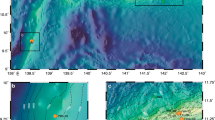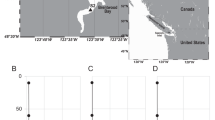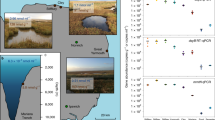Abstract
Biological methylation of metallic elements1 and the occurrence and cycling of organometals in the environment have been investigated in Japan during the 1950s and 1960s, where the ingestion of fish and shellfish contaminated with methylmercury compounds caused mercury poisoning2,3. Biomethylation ability has been demonstrated in bacteria, fungi and algae for As, Cd, Hg, Pb, Se, Sn, Te and Tl4–7. Naturally-occurring methylated species have been reported in estuaries and seawater for Sb8, As9, Ge10–13 and Sn14, although recent evidence suggests that some reports of methyltin species result from interferences by Ge and volatile sulphur compounds15. With the exception of Sb8, As9,12,16 and Ge11,12, there are no consistent estuarine or oceanic profiles for methylmetal compounds in the literature from which to judge their biogeochemical behaviour. Early investigations17–19 reported that methylgermanium species do not exist in the aquatic environment. Subsequently, we identified monomethylgermanium (MMGe) and dimethylgermanium (DMGe) in estuaries10,12, the Baltic Sea11 and the Bering and Sargasso seas13. We report here recent measurements of methylgermanium compounds in river water, estuaries, seawater and anoxic basins.
This is a preview of subscription content, access via your institution
Access options
Subscribe to this journal
Receive 51 print issues and online access
$199.00 per year
only $3.90 per issue
Buy this article
- Purchase on Springer Link
- Instant access to full article PDF
Prices may be subject to local taxes which are calculated during checkout
Similar content being viewed by others
References
Challenger, F. Chem. Rev. 36, 315–361 (1945).
McAlpine, D. & Araki, S. Lancet 2, 629–631 (1958).
Nelson, N. et al. Envir. Res. 4, 1–69 (1971).
Summers, A. O. & Silver, S. A. Rev. Microbiol. 32, 637–672 (1978).
Thayer, J. S. & Brinkman, F. E. in Advances in Organometallic Chemistry (eds Steve, F. G. A. & West, R.) 313–356 (Academic, New York, 1982).
Fleming, R. W. & Alexander, M. Appl. Microbiol. 24, 424–429 (1972).
Andreae, M. O. & Klumpp, D. Envir. Sci. Technol. 13, 738–741 (1979).
Andreae, M. O. in Trace Metals in Seawater (eds Wong, C. S., Boyle, B., Bruland, K. W., Burton, J. D. & Goldberg, E. D.) 1–19 (Plenum, New York, 1983).
Andreae, M. O. Limnol. Oceanogr. 24, 440–452 (1979).
Froelich, P. N., Hambrick, G. A. & Andreae, M. O. Trans. Am. geophys. Un. (Abstr.) 64, 715 (1983).
Andreae, M. O. & Froelich, P. N. Tellus 36 B, 101–117 (1984).
Froelich, P. N., Kaul, L. W., Byrd, J. T., Andreae, M. O. & Roe, K. K. Estuarine, Coastal Shelf Sci. (in the press).
Hambrick, G. A., Froelich, P. N., Andreae, M. O. & Lewis, B. L. Analyt. Chem. 56, 421–424 (1984).
Andreae, M. O., Byrd, J. T. & Froelich, P. N. Envir. Sci. Technol. 17, 731–737 (1983).
Andreae, M. O. & Byrd, J. T. Analyt. chim. Acta 156, 147–157 (1984).
Andreae, M. O. Deep-Sea Res. 25, 381–402 (1978).
Braman, R. S. & Tompkins, M. A. Analyt. Chem. 50, 1088–1093 (1978).
Andreae, M. O. & Froelich, P. N. Analyt. Chem. 53, 287–291 (1981).
Froelich, P. N. & Andreae, M. O. Science 213, 205–207 (1981).
Sharp, J. H., Culberson, C. H. & Church, T. M. Limnol. Oceanogr. 27, 1015–1028 (1982).
Knox, S., Langston, W. J., Whitfield, M., Turner, D. R. & Liddicoat, M. I. Estuarine, Coastal Shelf Sci. 18, 623–638 (1984).
Langston, W. J. Can. J. Fish. aquatic Sci. 40, 143–151 (1983).
Knox, S. et al. Estuarine, Coastal Shelf Sci. 13, 357–371 (1981).
Froelich, P. N., Hambrick, G. A., Andreae, M. O., Mortlock, R. A. & Edmond, J. M. J. geophys. Res.-Oceans (in the press).
Edmond, J. M., Spivack, A., Grant, B. C., Ming-hui, H. & Zexia, C. Continental Shelf Res 1, 251–262 (1983).
Boyle, E. A. et al. Geochim. cosmochim. Acta 38, 1719–1728 (1974).
Officer, C. B. Estuarine Coastal Mar. Sci. 9, 91–94 (1979).
Kaul, L. W. & Froelich, P. N. Geochim. cosmochim. Acta 48, 1417–1433 (1984).
Measures, C. I. & Burton, J. D. Analyt. chim. Acta 120, 177–186 (1980).
Author information
Authors and Affiliations
Rights and permissions
About this article
Cite this article
Lewis, B., Froelich, P. & Andreae, M. Methylgermanium in natural waters. Nature 313, 303–305 (1985). https://doi.org/10.1038/313303a0
Received:
Accepted:
Issue Date:
DOI: https://doi.org/10.1038/313303a0
This article is cited by
-
Germanium speciation by LC-HG-ICP/OES
Fresenius' Journal of Analytical Chemistry (1995)
-
Trace elements: Stable forms of methylated germanium in seawater
Nature (1985)
Comments
By submitting a comment you agree to abide by our Terms and Community Guidelines. If you find something abusive or that does not comply with our terms or guidelines please flag it as inappropriate.



